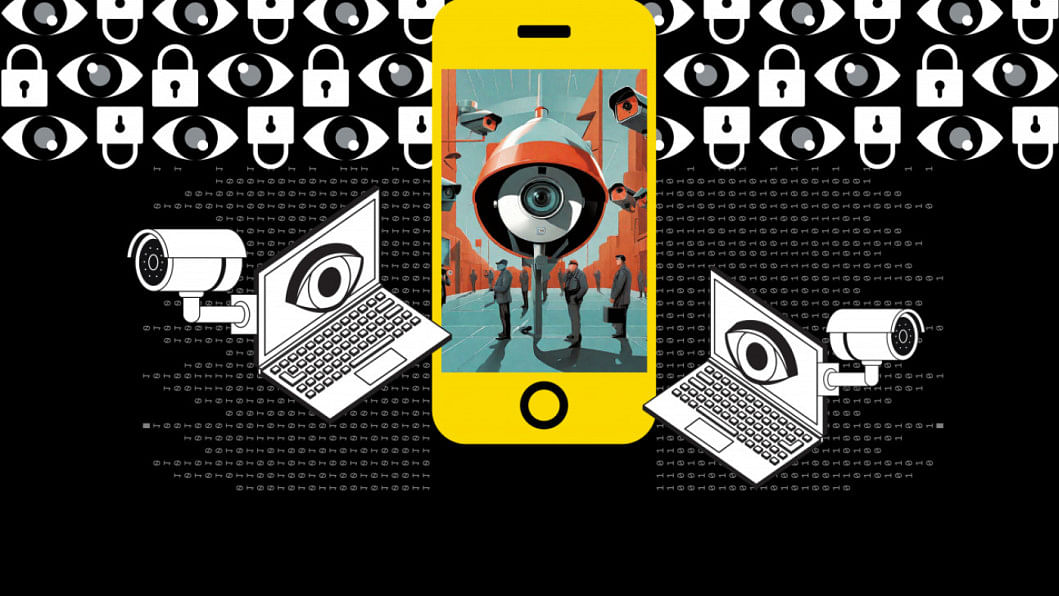Digital progress becomes a threat without cybersecurity

In mid-2020, Roxana Akhtar, a garment worker living in the capital's Mirpur area, checked her mobile banking account and discovered that someone had withdrawn Tk 18,000, her three months' savings, through multiple transactions. She had not made any transactions, nor had she shared her password or PIN with anyone. It was later revealed that criminals had cloned her national identity card and mobile number, accessed her account through a "SIM swap" scam, and withdrawn the money. She filed a complaint but received no response. Today, the number of victims like her exceeds one lakh across the country.
Cybercrime in Bangladesh has risen in recent years. Social media fraud, identity theft, phishing, ransomware attacks, and hacking into banking systems are no longer uncommon. Previously, several government websites were hacked, and the personal information of lakhs of citizens was leaked. In 2023, media reported that personal information of over five crore citizens had been disclosed without authorisation from a Bangladesh government website—one of the largest data breaches in the country's history.
The absence of a robust cybersecurity system to accompany the rapid expansion of digital services is an issue in this context. Many government and private organisations continue to operate with outdated firewalls, weak encryption, and insufficient technical staff. A 2024 Transparency International Bangladesh (TIB) review found numerous ambiguities and potential for abuse of power in current cybersecurity regulations, rendering them ineffective in preventing cybercrime.
The banking sector is in an especially critical state. In 2016, the hacking of the Bangladesh Bank website drew global attention, yet most banks have since failed to implement effective cybersecurity reforms. According to a study by the Bangladesh Institute of Bank Management (BIBM), 52 percent of banks in the country remain at high cyber risk. Many still lack dedicated cybersecurity units or conduct regular security audits. As a result, they have become easy targets for hackers.
The crime is as grave as its impunity. According to a Financial Express report, despite the increase in cybercrime complaints, most accused are acquitted in court. This is due to the lack of digital forensic technology, inefficient investigations, and legal complexities. The Cybersecurity Act, 2023, which replaced the Digital Security Act, 2018, remains controversial. Many of its problems persist—vague definitions of crimes, investigative delays, and prolonged trials.
The human cost is the most devastating. Behind every hacked account and every instance of stolen data, is a person—someone who is losing money, facing mental distress, and gradually losing trust in digital platforms. Not only urban professionals or tech users, but also expatriate workers, small business owners, and even school students are now victims of cybercrime. Women, in particular, suffer from cyber harassment, photo leaks, and online stalking. Yet in most cases, they do not receive justice, or even know where to file a complaint.
To address this challenge, first, the state must treat cybersecurity as a matter of national security. An effective framework combining advanced technology, skilled manpower, and coordination with NGOs is urgently needed. Second, public awareness must be increased. Citizens must learn to use strong passwords, enable two-factor authentication, avoid suspicious links, and respond prudently to incidents.
Cybersecurity education should be introduced at least from the secondary level. Often cybercrimes are committed by younger people. Educating them in digital awareness and ethical technology use can prevent many crimes before they occur. Additionally, cyber police units must be equipped with greater autonomy and advanced technology. Speedier case resolution, the admissibility of digital evidence, and stronger international cooperation are equally essential.
Bangladesh is becoming a digital nation, but its success depends on how securely we manage our digital space. If we cannot protect citizens' data, privacy, and digital rights, this transformation will be technological but not secure. Cybersecurity is not merely a technical issue—it is a question of social responsibility and political commitment.
Let Bangladesh's digital progress continue, but not on a path of mistrust. As technology advances, citizens must not fall into danger. Now is the time for cyber awareness, cyber prevention, and cyber justice.
Surja Mandal is an LLB student at the Department of Law at World University.
Views expressed in this article are the author's own.
Follow The Daily Star Opinion on Facebook for the latest opinions, commentaries, and analyses by experts and professionals. To contribute your article or letter to The Daily Star Opinion, see our submission guidelines.

 For all latest news, follow The Daily Star's Google News channel.
For all latest news, follow The Daily Star's Google News channel. 









Comments